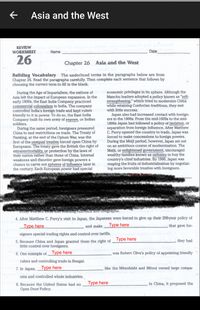Question
I need help with these questions

Transcribed Image Text:Asia and the West
REVIEW
WORKSHEET
Name
Date
26
Chapter 26
Asia and the West
Building Vocabulary The underlined terms in the paragraphs below are from
Chapter 26. Read the paragraphs carefully. Then complete each sentence that follows by
choosing the correct term to fill in the blank.
economic privileges in its sphere. Although the
Manchu leaders adopted a policy known as "self-
strengthening," which tried to modernize China
while retaining Confucian traditions, they met
with little success.
During the Age of Imperialism, the nations of
Asia felt the impact of European expansion. In the
early 1800s, the East India Company practiced
commercial colonialism in India. The company
controlled India's foreign trade and kept rulers
friendly to it in power. To do so, the East India
Company built its own army of sepoys,
soldiers.
During the same period, foreigners pressured
China to end restrictions on trade. The Treaty of
Nanking, at the end of the Opium War, was the
first of the unequal treaties forced upon China by
Europeans. The treaty gave the British the right of
extraterritoriality, or protection by the laws of
their nation rather than those of China. Internal
weakness and disorder gave foreign powers a
chance to carve out spheres of influence later in
the century. Each European power had special
Japan also had increased contact with foreign-
ers in the 1800s. From the mid-1600s to the mid-
1800s Japan had followed a policy of isolation, or
separation from foreign influence. After Matthew
C. Perry opened the country to trade, Japan was
forced to make concessions to foreign powers.
During the Melji period, however, Japan set out
on an ambitious course of modernization. The
Meiji, or enlightened government, encouraged
wealthy families known as zaibatsu to buy the
country's chief industries. By 1900, Japan was
reaping the fruits of industrialization by negotiat-
ing more favorable treaties with foreigners.
Indian
Taroads and telegraphs.
4. After Matthew C. Perry's visit to Japan, the Japanese were forced to give up their 200-year policy of
Type here
and make
Type here
that gave for-
eigners special trading rights and control over tariffs.
Type here
they had
5. Because China and Japan granted them the right of
little control over foreigners.
6. One example of __Type here
was Robert Clive's policy of appointing friendly
rulers and controlling trade in Bengal.
7. In Japan, Type here
like the Mitsubishi and Mitsui owned large compa-
nies and controlled whole industries.
8. Because the United States had no
Type here
in China, it proposed the
Open Door Policy.
Expert Solution
This question has been solved!
Explore an expertly crafted, step-by-step solution for a thorough understanding of key concepts.
This is a popular solution
Trending nowThis is a popular solution!
Step by stepSolved in 2 steps
